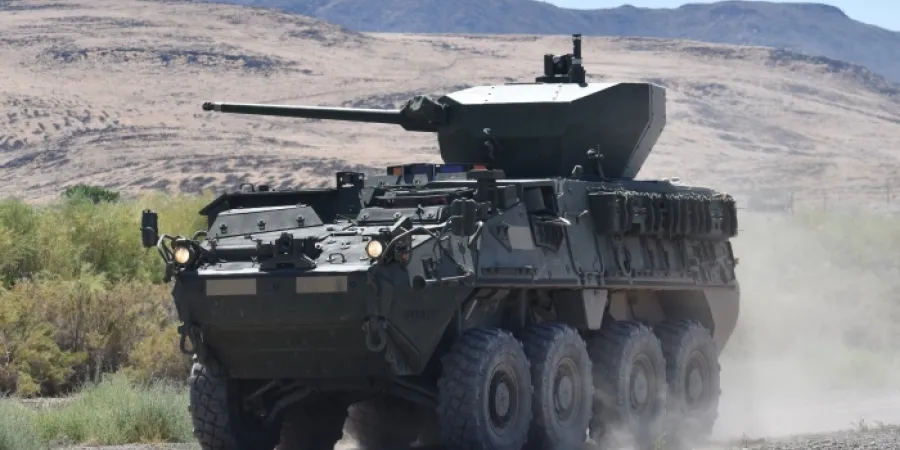In latest contract with US Army, Rafael to supply 30mm cannons for three Stryker brigades
The cannons based on the Israeli company's "Samson" family of turrets are part of Oshkosh weapon systems to be provided under a $942.9 million contract
Eyal Boguslavsky
| 06/06/2021
Oshkosh Defense announced on Friday that it was awarded a $942.9 million contract by the U.S. Army to integrate a 30mm Medium Caliber Weapon System (MCWS) onto the Stryker Double V Hull Infantry Carrier Vehicle.
In its statement, Oshkosh said that the company has teamed with Pratt Miller and Israel's Rafael Advanced Defense Systems to deliver an MCWS that provides increased lethality, accuracy, and range while maintaining the mobility and survivability of the Stryker vehicle. Oshkosh will integrate onto the vehicle's chassis a 30mm weapon system based on Rafael's proven "Samson" family of turrets. The contract calls for the integration of the MCWS onto three Stryker Brigade Combat Teams as well as a full spectrum of system technical support, interim contractor logistics support, and integrated product support, Oshkosh said.
According to Army officials, the first delivery order covers 91 vehicles valued at roughly $130 million. The Army could build up to six Stryker brigades with the MCWS version so the potential contract value is roughly $942 million over six years. The first unit to receive the MCWS Strykers will be the I-2 Stryker Brigade Combat Team out of Joint Base Lewis McChord in Washington State, with fielding by the unit expected to be completed by December 2023.
The Defense News website reported that Oshkosh beat out two other teams, adding that while the Army would not name competitors, sources familiar with the process identified them as a General Dynamics Land Systems and Kongsberg Defense team and a Leonardo DRS and Moog team.
The cannons based on the Israeli company's "Samson" family of turrets are part of Oshkosh weapon systems to be provided under a $942.9 million contract
Oshkosh Defense announced on Friday that it was awarded a $942.9 million contract by the U.S. Army to integrate a 30mm Medium Caliber Weapon System (MCWS) onto the Stryker Double V Hull Infantry Carrier Vehicle.
In its statement, Oshkosh said that the company has teamed with Pratt Miller and Israel's Rafael Advanced Defense Systems to deliver an MCWS that provides increased lethality, accuracy, and range while maintaining the mobility and survivability of the Stryker vehicle. Oshkosh will integrate onto the vehicle's chassis a 30mm weapon system based on Rafael's proven "Samson" family of turrets. The contract calls for the integration of the MCWS onto three Stryker Brigade Combat Teams as well as a full spectrum of system technical support, interim contractor logistics support, and integrated product support, Oshkosh said.
According to Army officials, the first delivery order covers 91 vehicles valued at roughly $130 million. The Army could build up to six Stryker brigades with the MCWS version so the potential contract value is roughly $942 million over six years. The first unit to receive the MCWS Strykers will be the I-2 Stryker Brigade Combat Team out of Joint Base Lewis McChord in Washington State, with fielding by the unit expected to be completed by December 2023.
The Defense News website reported that Oshkosh beat out two other teams, adding that while the Army would not name competitors, sources familiar with the process identified them as a General Dynamics Land Systems and Kongsberg Defense team and a Leonardo DRS and Moog team.



